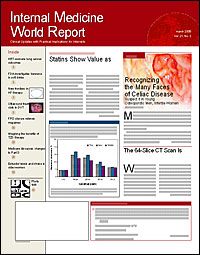Publication
Article
Internal Medicine World Report
Vitamin/Mineral Supplementation Beneficial in Hospitalized Elderly
Author(s):
In elderly, undernourished hospitalized patients, oral supplementation may help reduce mortality, according to results of a new study (Ann Intern Med. 2006;144: 37-48). The same is not true, however, for elderly persons living at home or for well-nourished elderly in any setting.
The literature shows that up to 55% of older adults are undernourished upon admission to the hospital, which, in turn, affects their ability to recover and may be a marker for the severity of existing medical conditions.
This study, conducted by Anne C. Milne, MSc, of the University of Aber?deen, Aberdeen, Scotland, and colleagues, was based on data from the Cochrane Central Register of Controlled Trials, Medline, Embase, HealthStar, CINAHL, BIOSIS, and CAB. The investigators chose 55 randomized and quasi-randomized controlled trials that evaluated oral protein and energy supplementation versus placebo or controlled treatment in elderly patients. Included was the recent Feed Or Ordinary Diet (FOOD) trial, which looked at oral nutritional supplements in patients with stroke. The trials were reviewed for all-cause mortality, number of patients with morbidity or complications, duration of hospital stay, functional status, patients' professed quality of life, percentage weight change, percent variation in midarm muscle circumference, acceptability of the supplement, and overall trial quality.
Overall, 9187 patients were included in the trials, the majority of whom (45%) had a stroke. Patients in short-term care hospitals who received oral supplements appeared to have fewer complications and lower mortality if they were undernourished at baseline.
Key points
Up to 55% of older adults are undernourished at admission.
Undernourishment reduces a patient's ability to recover.
Vitamin and mineral supplementation appears to reduce in-hospital mortality.
A total of 17 trials reported that the supplements (mainly vitamins and minerals) were well accepted by most patients, although some of the studies, notably the ones in which supplements were given over a longer period of time, reported substantial adherence issues (24%-25% of participants). There were no reported changes in survival with oral supplements in the trials that included patients with stroke or hip fracture.
Among patients who received vitamin and/or mineral supplements and who were undernourished at baseline, there was a trend toward shorter hospital length of stay. And 14 trials showed that the pooled weighted mean difference for percentage weight change increased by 1.75% in those who received the ?supplements.
"Our review supports the findings of previous meta-analyses that mortality is reduced with protein and energy supplementation, although the reduction is borderline significant," the investigators wrote.





